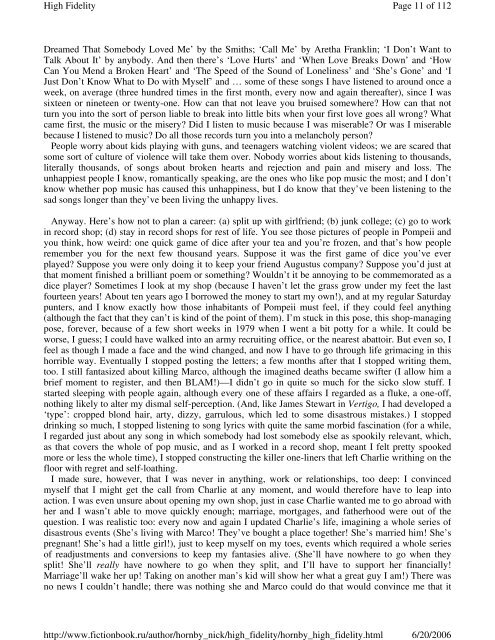Create successful ePaper yourself
Turn your PDF publications into a flip-book with our unique Google optimized e-Paper software.
<strong>High</strong> <strong>Fidelity</strong><br />
http://www.fictionbook.ru/author/hornby_nick/high_fidelity/hornby_high_fidelity.html<br />
Page 11 of 112<br />
6/20/2006<br />
Dreamed That Somebody Loved Me’ by the Smiths; ‘Call Me’ by Aretha Franklin; ‘I Don’t Want to<br />
Talk About It’ by anybody. And then there’s ‘Love Hurts’ and ‘When Love Breaks Down’ and ‘How<br />
Can You Mend a Broken Heart’ and ‘The Speed of the Sound of Loneliness’ and ‘She’s Gone’ and ‘I<br />
Just Don’t Know What to Do with Myself’ and … some of these songs I have listened to around once a<br />
week, on average (three hundred times in the first month, every now and again thereafter), since I was<br />
sixteen or nineteen or twenty-one. How can that not leave you bruised somewhere How can that not<br />
turn you into the sort of person liable to break into little bits when your first love goes all wrong What<br />
came first, the music or the misery Did I listen to music because I was miserable Or was I miserable<br />
because I listened to music Do all those records turn you into a melancholy person<br />
People worry about kids playing with guns, and teenagers watching violent videos; we are scared that<br />
some sort of culture of violence will take them over. Nobody worries about kids listening to thousands,<br />
literally thousands, of songs about broken hearts and rejection and pain and misery and loss. The<br />
unhappiest people I know, romantically speaking, are the ones who like pop music the most; and I don’t<br />
know whether pop music has caused this unhappiness, but I do know that they’ve been listening to the<br />
sad songs longer than they’ve been living the unhappy lives.<br />
Anyway. Here’s how not to plan a career: (a) split up with girlfriend; (b) junk college; (c) go to work<br />
in record shop; (d) stay in record shops for rest of life. You see those pictures of people in Pompeii and<br />
you think, how weird: one quick game of dice after your tea and you’re frozen, and that’s how people<br />
remember you for the next few thousand years. Suppose it was the first game of dice you’ve ever<br />
played Suppose you were only doing it to keep your friend Augustus company Suppose you’d just at<br />
that moment finished a brilliant poem or something Wouldn’t it be annoying to be commemorated as a<br />
dice player Sometimes I look at my shop (because I haven’t let the grass grow under my feet the last<br />
fourteen years! About ten years ago I borrowed the money to start my own!), and at my regular Saturday<br />
punters, and I know exactly how those inhabitants of Pompeii must feel, if they could feel anything<br />
(although the fact that they can’t is kind of the point of them). I’m stuck in this pose, this shop-managing<br />
pose, forever, because of a few short weeks in 1979 when I went a bit potty for a while. It could be<br />
worse, I guess; I could have walked into an army recruiting office, or the nearest abattoir. But even so, I<br />
feel as though I made a face and the wind changed, and now I have to go through life grimacing in this<br />
horrible way. Eventually I stopped posting the letters; a few months after that I stopped writing them,<br />
too. I still fantasized about killing Marco, although the imagined deaths became swifter (I allow him a<br />
brief moment to register, and then BLAM!)—I didn’t go in quite so much for the sicko slow stuff. I<br />
started sleeping with people again, although every one of these affairs I regarded as a fluke, a one-off,<br />
nothing likely to alter my dismal self-perception. (And, like James Stewart in Vertigo, I had developed a<br />
‘type’: cropped blond hair, arty, dizzy, garrulous, which led to some disastrous mistakes.) I stopped<br />
drinking so much, I stopped listening to song lyrics with quite the same morbid fascination (for a while,<br />
I regarded just about any song in which somebody had lost somebody else as spookily relevant, which,<br />
as that covers the whole of pop music, and as I worked in a record shop, meant I felt pretty spooked<br />
more or less the whole time), I stopped constructing the killer one-liners that left Charlie writhing on the<br />
floor with regret and self-loathing.<br />
I made sure, however, that I was never in anything, work or relationships, too deep: I convinced<br />
myself that I might get the call from Charlie at any moment, and would therefore have to leap into<br />
action. I was even unsure about opening my own shop, just in case Charlie wanted me to go abroad with<br />
her and I wasn’t able to move quickly enough; marriage, mortgages, and fatherhood were out of the<br />
question. I was realistic too: every now and again I updated Charlie’s life, imagining a whole series of<br />
disastrous events (She’s living with Marco! They’ve bought a place together! She’s married him! She’s<br />
pregnant! She’s had a little girl!), just to keep myself on my toes, events which required a whole series<br />
of readjustments and conversions to keep my fantasies alive. (She’ll have nowhere to go when they<br />
split! She’ll really have nowhere to go when they split, and I’ll have to support her financially!<br />
Marriage’ll wake her up! Taking on another man’s kid will show her what a great guy I am!) There was<br />
no news I couldn’t handle; there was nothing she and Marco could do that would convince me that it


